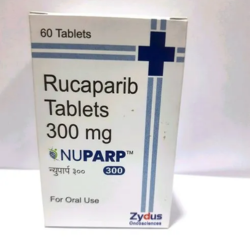Description
Azacitidine Uses:
Azacitidine is a nucleoside metabolic inhibitor used to treat patients with the following FAB myelodysplastic syndrome (MDS) subtypes:- refractory anemia or refractory anemia (RA) with ringed sideroblasts (RARS) (if accompanied by thrombocytopenia or neutropenia requiring transfusions)
- refractory anemia (RA) with excess blasts (RAEB)>
- refractory anemia (RA) with excess blasts in transformation (RAEB-T)
- chronic myelomonocytic leukemia (CMMoL)
Dosage:
The recommended starting dose for the initial treatment cycle, for all patients regardless of baseline hematology values, is Azacitidine 75 mg/m2 daily for 7 days to be given by subcutaneous injection or intravenous infusion. Premedicate patients for nausea and vomiting. Repeat cycles every four weeks. After two cycles, dosage may increase to Azacitidine 100 mg/m2 in case no beneficial effect is observed and no toxicity other than vomiting and nausea has occurred. Treat patients for a minimum of four to six cycles. Complete/partial response may require additional cycles. Treatment with Azacitidine should be continued as long as the patient continues to benefit. Monitor patients for renal toxicity and for hematologic response; delay/reduce the dosage as appropriate.Side Effects:
The most commonly reported side effects due to Azacitidine by the subcutaneous route are:- nausea
- anemia
- vomiting
- pyrexia
- leukopenia
- diarrhea
- constipation
- neutropenia
- ecchymosis
- thrombocytopenia
- injection site erythema
- petechiae
- rigors
- weakness>
- hypokalemia
Storage:
Azacitidine for injection is supplied as a lyophilized powder in 100 mg single-dose vials packaged in cartons of 1 vial. Store unreconstituted vials at 25°C (77°F); excursions permitted to 15°C to 30°C (59°F to 86°F).Availability in India:
The Indian Pharma helps connect buyers with suppliers who can ship AZACITIDINE at the global level as per the needs of buyer’s. The Indian Pharma provides a guarantee of quality and delivery for the AZACITIDINE Injections.Buying Procedure:
In order to buy AZACITIDINE, you can contact us at our Toll-free Number 1800 889 1064 or on WhatsApp Number +91 8130290915 or an Email to us at: info@theindianpharma.com along with your Identity Proof, Valid Prescription Letter and Medical Reports.Conclusions:
Azacitidine treatment results in significantly higher RR, improved QoL, reduced risk of leukemic transformation, and improved survival compared with supportive care. Azacitidine provides a new treatment option that is superior to supportive care for patients with the MDS subtypes.




